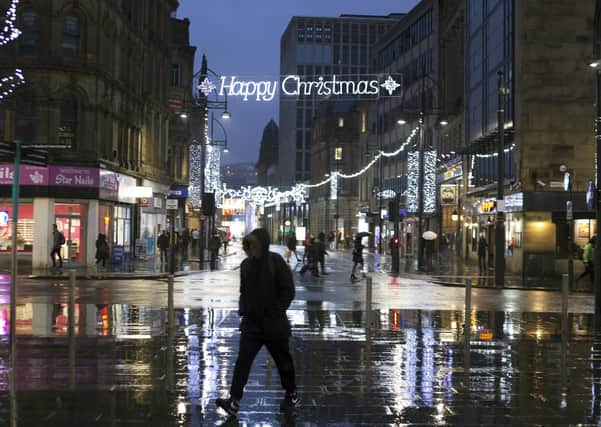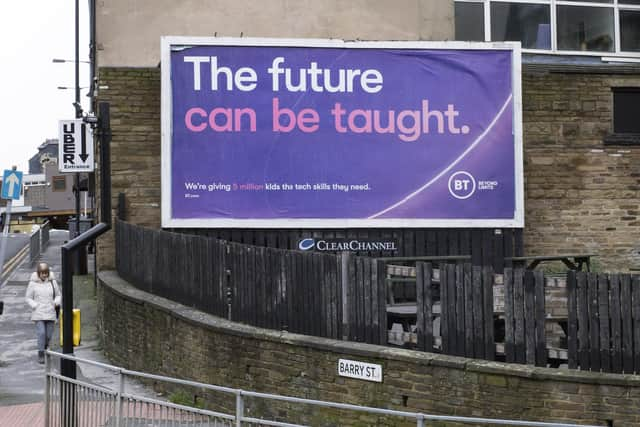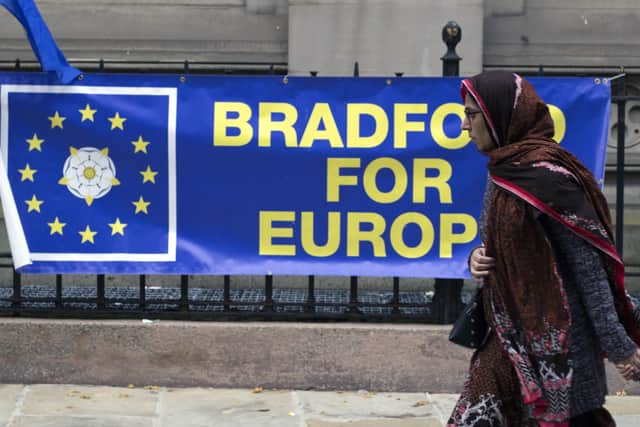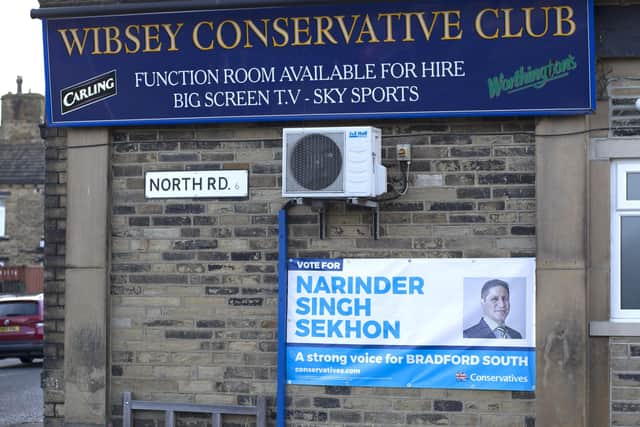Election disconnection: What the people of Bradford taught two academics about British politics


As Stephen Coleman and Jim Brogden tramped through the streets of Bradford in December 2019 in an attempt to understand public feeling about the ongoing General Election campaign, they quickly made a startlingly realisation – there was almost zero evidence a national vote was due to take place.
“No sign of stickers or badges. No graffiti on walls. No loudspeaker vans. No leaflets being handed out,” the pair of academics recount in their new book, Capturing the Mood of Democracy: The British General Election 2019.
Advertisement
Hide AdAdvertisement
Hide Ad“Walking across the city in the weeks before polling day, we came across a few lonely party placards attached to wooden poles in front of houses, but no other semiotic evidence of an election campaign.”


Coleman, a professor of Political Communication at the University of Leeds, and Dr Brogden, a lecturer in Visual Culture at the same institution, say this disconnection between the political tub-thumping on television and social media and how things were playing out in real life was repeated over and over again during their time in Bradford.
Speaking over Zoom, Brogden explains: “The research was primarily through walking in areas that people who aren’t from Bradford might be a little bit intimidated by. We were walking in a three-mile zone from the centre who you alight from the station.
“Over the course of the election, we were walking most days for at least three hours trying to decipher the mood. The temperature was very cold, it was freezing and perhaps what people associate with the North of England.
Advertisement
Hide AdAdvertisement
Hide Ad“There was no visual evidence that the election was taking place. We saw plenty of advertisements and a BT campaign with its statements about ‘The future can be taught’. But they was no political literature and posters in people’s windows or billboard posters. People seemed to be rushing through the centre of Bradford to get somewhere. It wasn’t a place they wanted to dawdle. They had other things to sort in their life. There was a general air of anxiety and we were seeing that this election was probably not on their mind.”


Coleman says that physical disconnection with the snap election was a reflection of many people’s wider emotions about the vote.
“A lot of it is to do with language. We spoke to a guy playing snooker. Jim said what do you think about the election and he said ‘I’m not a politician’,” he explains.
“What I read from that is people think you have to speak like a politician to be involved in politics. For a lot of middle class people they have that confidence and it is a good club to be in. But vast numbers of people feel excluded. We spoke to a group in a pub and one them said to us ‘I’m not going to show myself to be a d*******’. We sat down for a beer separately and then they all started talking about the election between themselves. What they meant was, ‘We don’t want to talk about it to people like you’.
Advertisement
Hide AdAdvertisement
Hide Ad“We need to have politics that is inclusive rather than exclusive. It is quite an investment to watch Newsnight. Jim and I watch it but most people don’t – it doesn’t speak their language. They feel the kind of things they might say won’t be taken seriously.


“We went up to a group of guys outside a courthouse and said what do you think about the election and got a look of, ‘Are you taking the p***?’”
But the pair say they would get profound responses from their conversations. Brogden says: “We went up to one family and said ‘What do you think the problems are in Bradford?’ and the daughter just gestured with her arms spread out as if to say ‘just look around’.”
The pair also noticed a pattern in the way people would talk about the city. “Some were keen to tell us that they liked living there, although this was usually followed by ‘despite its problems’,” the book recounts. “There was a widespread belief that Bradford was not well regarded by people from other cities: it is seen as a troubled city.”
Advertisement
Hide AdAdvertisement
Hide AdIn the middle of the 19th century, Bradford was a global centre of the textile trade but is now the fourth most income-deprived district in the country and has the largest gap between rich and poor of any local authority district in England.
The book states the city’s challenges are typically associated – often unfairly – with rising immigration levels.
“Bradford came to be seen as a national testbed of multiculturalism. When things go wrong in the city, it is too glibly described as a failure of race relations. However, Bradford, as a post-industrial city, is faced with a much deeper problem that cuts across ethnic divisions: poverty.”
Coleman says: “There is this unspoken critic that people in Bradford feel they have to talk to – this Middle England idea that Bradford is the disaster that any British city could fall into if they are not careful. It is not like that in reality. Many places would benefit from being more like Bradford.”
Advertisement
Hide AdAdvertisement
Hide AdWith Bradford’s three central constituencies all being Labour strongholds (although Keighley which sits in the Bradford Council area was won by the Conservatives from Labour), the city is perhaps not the first place most people wanting to analyse the election would head.
But the pair say this was among the reasons they chose it - as well as the fact they both live within its political boundaries.
“We chose Bradford because it was not London,” they write. “It was one of those places that people from London head up to when they want to see how ‘real people’ are making sense of the election. We chose Bradford because, in many respects, its story of imperial affluence and recent decline is a microcosm of British history. This is a place which at the beginning of the twentieth century was one of the most prosperous cities in Europe, just as Britain was the most powerful empire in the world.”
Another common theme amongst their conversations was the sense of Bradford being overlooked for investment - particularly in comparison to its near-neighbour Leeds.
Advertisement
Hide AdAdvertisement
Hide Ad“As we spoke to people who regarded themselves as non-political, conversation would often turn to ‘the people with big money down in London’ or how Bradford had lost out because Leeds (a mere 10 miles away) had taken all the investment,” the book states.
In addition to speaking to passers-by, the pair also set up many interviews – from places as diverse as a Conservative club to a mosque and a gym, while they also joined party activists and saw them met more often than not with suspicion and silence rather than enthusiasm from the potential voters they were canvassing.
One section of the book focuses on the reflections of former Bradford Council leader David Green, who is referred to as ‘Leo’ in the book.
In the book, he describes how despite being a Labour Party activist for 47 years, he went into the election “with very little hope, very little enthusiasm and very little optimism”. As a person of Jewish heritage, he says “he was hanging onto my party membership by my fingernails” after becoming disillusioned with the party’s failure to deal with anti-semitism.
Advertisement
Hide AdAdvertisement
Hide AdHe is quoted as saying: “If you look at what the party at its top level is doing to deal with anti-semitism, which whatever apologists say is an issue in the Labour Party, they’re not doing much. In fact, they seem to be putting them up as candidates.”
Speaking today to The Yorkshire Post, Green says he is hopeful things are now moving in a more positive direction following the party accepting the findings of a recent Equality and Human Rights Commission report.
“Things are happening but we will have to see how they pan out. There does seem to be an acceptance there is a problem and it is a problem we need to deal with. It is the first steps down the road.”
But while the topic of anti-semitism was understandably causing anguish in Labour ranks during the December 2019 campaign, Brogden and Coleman say they heard relatively little from ordinary people about it.
Advertisement
Hide AdAdvertisement
Hide AdColeman says: “It only came up in a working men’s club where they raised anti-semitism as one of the reasons why they would never vote for Corbyn.”
However, Coleman says he was unsurprised by the election night result as Boris Johnson’s Conservatives won a sizeable majority on his promise to ‘Get Brexit Done’.
“What was very clear was that sense that whatever chance Labour might have had was weakened by the tremendous distrust amongst Labour activists to each other. We would have been surprised if there was a Labour majority.”
The pair say their main takeaway from their time in Bradford was the need for politics to connect with local concerns.
Advertisement
Hide AdAdvertisement
Hide AdColeman says: “When we were talking to women working in the bank who expressed very little interest in the election, we said what should be the issue and they said ‘dangerous driving in Bradford’. While the big narrative of the election campaign is playing out, people have their own things that are bigger issues to them.”
Book wins international praise
Coleman and Brogden’s book about Bradford during the election and its lyrical style has won praise from academics across the world.
Luc Pauwels, from University of Antwerp in Belgium, said the study “offers a profound meditation on the state of democracy as experienced and enacted in the everyday”.
Douglas Harper, from Duquesne University in America, said: “It reads alternatively like a novel by Ali Smith and a full out exploration of modern Britain. Photographs by Brogden visualize the mood of contradiction, disappointment and possibility that this historical moment offers.”
Advertisement
Hide AdAdvertisement
Hide AdCapturing the Mood of Democracy: The British General Election 2019 by Stephen Coleman and Jim Brogden (Palgrave Macmillan) is out now priced £44.99
Support The Yorkshire Post and become a subscriber today. Your subscription will help us to continue to bring quality news to the people of Yorkshire. In return, you’ll see fewer ads on site, get free access to our app and receive exclusive members-only offers. Click here to subscribe.
Comment Guidelines
National World encourages reader discussion on our stories. User feedback, insights and back-and-forth exchanges add a rich layer of context to reporting. Please review our Community Guidelines before commenting.